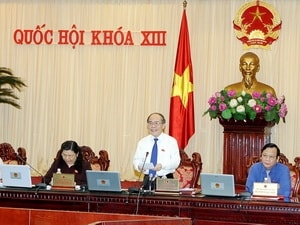The National Assembly Standing Committee questioned the Chief Justice and the Minister of Education and Training.
Implementing the 16th session agenda, on March 22, the 13th National Assembly Standing Committee held a question-and-answer session with Chief Justice of the Supreme People's Court Truong Hoa Binh and Minister of Education and Training Pham Vu Luan.

National Assembly Chairman Nguyen Sinh Hung chaired the session.
(Photo: An Dang/VNA)
The question and answer session was conducted online to all National Assembly delegations from 63 provinces and cities nationwide; and was also broadcast live on radio and television for voters to follow.
National Assembly Chairman Nguyen Sinh Hung chaired the question and answer session; National Assembly Vice Chairman Uong Chu Luu directed the question and answer session.
In his opening speech, National Assembly Chairman Nguyen Sinh Hung said that in carrying out the tasks of the National Assembly, in the agenda of this session, the National Assembly Standing Committee questioned the Chief Justice of the Supreme People's Court and the Minister of Education and Training. The questioning sessions had different contents but all had the same purpose of improving the quality of the State apparatus' operations.
Regarding the judiciary, National Assembly Chairman Nguyen Sinh Hung emphasized the need to improve the quality of staff to contribute to making the court become the center of work of the judiciary. Regarding the education and training sector, National Assembly Chairman Nguyen Sinh Hung emphasized the issue of fundamental and comprehensive innovation to meet the country's development requirements and the people's educational and training needs.
At the question-and-answer session on the morning of March 22, National Assembly deputies asked Chief Justice of the Supreme People's Court Truong Hoa Binh about solutions to overcome limitations in professional qualifications, work experience, and sense of responsibility of a number of judges and People's Assessors in local courts that affect the quality of adjudication work; the direction and guidance on the unified application of law by the Supreme People's Court to People's Courts at all levels; measures to strengthen inspection and supervision to limit negativity in adjudication work...
Responding to the question of National Assembly Chairman Nguyen Sinh Hung about the eight targets stated in Resolution 37 of the National Assembly on the work of preventing and combating law violations and crimes, the work of the Supreme People's Procuracy, the Supreme People's Court and the work of enforcing judgments in 2013, Chief Justice Truong Hoa Binh affirmed: the entire court sector expressed the highest determination to implement the proposed contents.
Regarding the question of delegate Do Van Duong about the small number of corruption cases brought to trial, but the high proportion of defendants who were given suspended sentences and too light prison sentences by the court, Chief Justice of the Supreme People's Court Truong Hoa Binh explained: The court only tries cases that the Procuracy has prosecuted and has an indictment, on the basis of which the Procuracy exercises the right to prosecute and the Court opens a trial. The number of corruption cases brought to trial is more or less related to the prosecution responsibility of the Procuracy and the discovery and investigation of the investigation agency.
Regarding the high rate of suspended sentences that many delegates have reported, Chief Justice Truong Hoa Binh said that the Party Committee of the Supreme People's Court has issued a resolution and the Chief Justice of the Supreme People's Court has issued a document directing a thorough and drastic inspection of this issue. Every year, the Supreme People's Court conducts many separate inspections on this topic. On the other hand, the Court's trials are based on the indictment and prosecution of the Procuracy. Corruption cases brought to trial in recent times have all applied severe penalties to the masterminds.
Regarding the high rate of suspended sentences, Chief Justice Truong Hoa Binh said that most of the defendants were given suspended sentences based on legal grounds, but there were also some cases where the law was not applied correctly. The cases that were not applied correctly were appealed to the appellate court or the Supreme Court to resolve the case according to the legal basis. All cases where judges applied illegal suspended sentences were temporarily suspended from reappointment for review.
The Chief Justice added that the industry is currently drafting a new resolution to strictly regulate the conditions for suspended sentences, ensuring compliance with legal regulations for corruption crimes to serve the requirements of the fight against crime.
Regarding the high proportion of civil appeals in cases, Chief Justice Truong Hoa Binh explained that with the large number of appeals, there are also many appeals. Each year, the court can only consider and resolve about 200 cases, but the number of appeals each year is nearly 400, leading to a situation where the trial cannot be conducted in time.
Regarding the issue of court officials receiving bribes and fixing cases, Chief Justice Truong Hoa Binh admitted: This phenomenon is real and every year the court reports the number of cases prosecuted for criminal liability. Regarding the results of administrative case settlement in recent times, Chief Justice Truong Hoa Binh said that the settlement of administrative cases is not of high quality and is still slow, which is a reality that needs to be overcome because this is a difficult type of case. In the coming time, the court will overcome this situation.../.
According to (TTXVN) - LT






